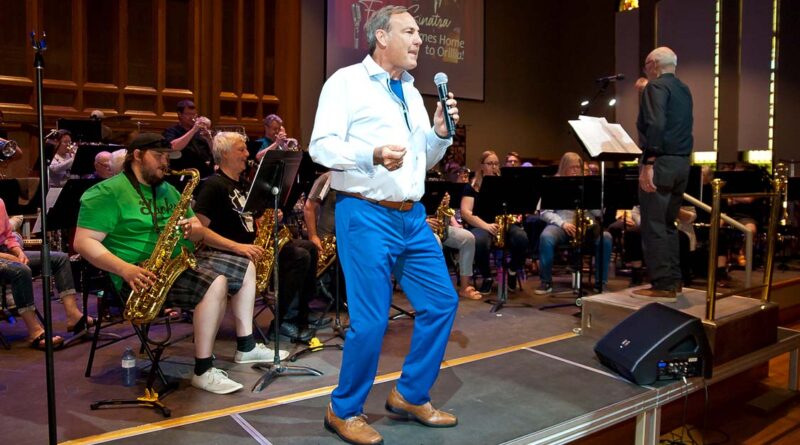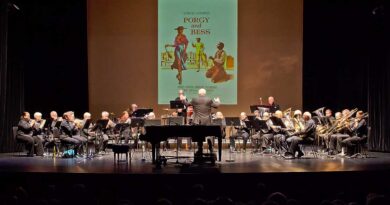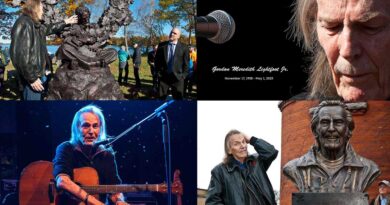His Way Is the Way
By John Swartz
The Orillia Concert Band concerts at St. Paul’s Centre are going to be incredible. I was in to see a bit of rehearsal Monday night and the band is sounding better, there are a few more band members, and I heard Rick Stephenson sing Where or When – of all the tunes he sings one of my favourites.
Wait, Singing? At a band concert? It’s not like the OCB hasn’t had singers before. What makes this one special is Rick lived here for 30 years.
“We moved to Kingsville,” Rick said. “I wanted very little winter, an easier winter.”
He should have asked me about that since I grew up in the same territory and learned to hate winter.
So this is a return to familiar ground. Rick also has had a very long career doing a Frank Sinatra tribute show, for a while backed by an 18-piece big band, called The Endangered Species.
They played the Opera House a few times, did Breakfast Television, and opened the Jerry Lewis telethon once. He even used to have an instrumental piece in his show – for the band – A Buddy Rich tune (Ya Gotta Try). Some of you know I’m kind of familiar with Buddy’s recordings, and I was most impressed with how the band played it.
“I took a break for a bit and we took up tennis. We play two or three hours every day. Once in a while we’d get a call for a corporate gig for a bank in Toronto and you can’t say no,” Rick said. That has turned into gigging several times a month.
“The good thing now is I’m by myself. Things have changed, with the corporate world too, they don’t want an 18 piece band and pay to put on a big show. Now I can go out and do a Sinatra cocktail hour and sing for an hour and a bit.”
Musicians don’t retire. They may slow down on the travelling, loading and unloading, but playing (Rick started as a trombone player) never ends.
“When I retired I set up a pretty good home studio. I had a bunch of people in the music business, friends I connected with, and I started buying master tapes. It was an expensive endeavour at the beginning. It was just lay out money, but then I started remastering some stuff and I blended some of my band tracks into the same (master) tracks. I’ve been learning a lot about the recording studio thing. My son is a sound engineer at Fallsview (Casino) for ten years, he’s helped me a lot.”
Those masters he’s talking about are the Sinatra studio recordings, plus some others. You can watch/listen to the result on many of those songs on his Youtube page.
You can also find Youtube playlists of all Rick’s albums on Youtube here.
Through the magic of digital audio processing, he can strip out Sinatra’s voice, or separate instrumental voices and remix them without losing recording quality. It works the other way too.
“I can just have his vocals and listen to it.”
It’s not an easy click of the button to remove anything from a master recording.
“This took me three years to do. It’s a fairly tedious process. But now I’ve got a bunch of songs that are the core.”
He didn’t stop there.
“I’ve been doing this so long I didn’t want to base everything about singing Fly Me To The Moon or Strangers In The Night for the rest of my life. I expanded it to other songs that are part of the Sinatra genre, but a little bit more obscure. Things like Indian Summer – that was Duke Ellington; I got the master tracks for that.”
“I’ve got close to 300 songs. I’ve been trying to interject some different material. I’ve got a John Denver song. I’m working in a song by a cellist from Iceland, Laufey, who did a beautiful arrangement of an original song that sounds like what Sinatra would sing if he was alive today. I’m trying to put some different material in as well as the Sinatra to keep everybody interested.”
Using backing tracks allows Rick to get lots more gigs, but he jumps at the chance to work with a band as he is doing with this concert.

“So now I have the backing tracks and the still same piano player I’ve had for 30 years (John Brown),” Rick said. Brown is also part of this concert.
When you listen to the videos you’ll hear he’s managed to replace live in performance the vocals and blend together Brown’s piano work with the old recordings in a way that sounds like they belong together, as opposed to some cheesy attempt to cash in on nostalgia.
He’s had some success, the decades long career doing gigs singing Sinatra’s tunes, making recordings (he has a new one coming soon that doesn’t include any songs Sinatra recorded) and getting recognition from peer musicians for his work (his big band was studded with players).
“I got nominated for Tribute Artist of the Year in Nashville. It’s called the Josie Music Awards, it’s an independent music award thing, but it’s huge, it’s all over the world.”
“I tied for first in an international Sinatra singing competition in Hoboken (New Jersey).” Last September he did a gig in New York City with a band.
Rick has an interesting story about the Hoboken thing. Afterwards he went to dinner with his wife, Cathy, and had a table near the piano. Of course, in the New York City area having a pianist play during dinner is a cottage industry. The pianist sat down and proceeded to play Early Morning Rain. As Rick tells it, at the break, Rick told the piano player about the coincidence of being In Hoboken and the reason why (Sinatra is from Hoboken), going to dinner and the pianist proceeds to play a song written by someone from Rick’s hometown. Rick said the pianist was astonished and ended up joining them for a drink.
Oh, and you’ll find a video he made on his page of Hurt (there are other covers of Johnny Cash tunes too). That’s a song that needs to be sung a certain way and he does a very good job, massaging the lyrics to fit the time.
“During the COVID thing I taught myself guitar so I could play the guitar for that song.. I always listened to Johnny Cash when I was a kid.” Rick also played bass and piano for that recording.
You can also find his music on all the streaming services (Spotify, Amazon, Apple Music, Deezer, iHeart, and Tidal).
Rick had noted composer, arranger and trombonist Ron Collier as a mentor when he was younger. Collier wrote some charts for Rick’s band too. Collier’s big claim is to have written for Duke Ellington.

Conversation with Rick has always turns to the fondness of a particular album recorded in 1959, a modern band (Tower of Power) and the intricacies of arranging and playing music. Those are all signs of the making of a musician and of motivation for making music, replicating or incorporating what you’ve learned just because you can.
“I’m glad to be a critical listener. Otherwise I think I would have been done 40 years ago. You have to listen and appreciate things. I have always been a fan of the band, whatever band it was,” Sinatra used Rick said. It should be noted one of the band leaders on the album noted above also lead bands Sinatra recorded with. Bob Hope aside, Les Brown made some great music.
“I’m listening to a song called In the Still Of The Night and I hear the 4 bar trombone solo is by Frank Rosolino. Frank Rosselino was probably the heaviest trombone player at that time in the world – him and Bill Watrous where the heaviest. When I heard that I’m like, ah, my god, that’s why I listen to Frank Sinatra, because you never know what’s going to show up, what kind of music or musicians are going to play. That’s exciting to me.”
I
This writer never used to like Sinatra, that was my parent’s music, and I would tune out whenever any of it hit my ears. It was discovering the bandleader, Les Brown, of one of my favourite recordings also worked for Sinatra that lead me to listening more critically to the bands and arrangements Sinatra used.
It was also from Rick, his curiosity and insight he had about Sinatra’s singing, born of being a trombone player, and how Sinatra’s phrasing works in a way few have been able to replicate, which lead to becoming an appreciative fan of Sinatra’s music.
Rick is lucky to have a voice that has a similar tone and timbre as Sinatra, but it’s the music student’s insight which sets him apart from everyone else. Rick didn’t want to do schtick to make a buck, he wants to pay homage to one of the great musicians and singers of the modern era.

“That’s me. I am not going to wear a hat, throw a coat over my shoulder, smoke a cigarette and try and make you believe you’re seeing Frank Sinatra. It’s about the music. If the music works, great. That hat and coat and a cigarette and a drink are not going to help you.”
There’s more to learn about Rick on his website.
So, two more things about this concert. Rick has already recorded If You Could Read My Mind for his next album and he thought Saturday night would be a good time to sing it in public for the first time.
The OCB will play some tunes without Rick, and the concert opener, Robert W. Smith’s On Eagles Wings sounded excellent Monday evening. Smith is someone I crossed paths with once or twice back in my youth. He died unexpectedly last September, so hearing the OCB do such a good job with it is a fitting tribute.
OK, three things, tickets. Saturday night’s performance at St. Paul’s Centre is almost sold out. Monday there were only 10 tickets left online. However, they saved 50 out of the 400 seat capacity to sell at the door (some OCB concertgoers aren’t able to buy online). The show starts at 7:30 p.m. but I’d go much earlier to get a ticket at the door.
The band realized with a week of tickets going on sale they were selling at a faster pace than any of their other concerts, and two weeks later announced they would do a second concert Sunday afternoon at 2:30 p.m. But, those online sales are going pretty fast too, so don’t delay.
(Photos by Swartz – SUNonline/Orillia and Images Supplied) Main: Rick Stephenson joins the Orillia Concert Band with conductor Randy Hoover Saturday night and Sunday afternoon at St. Paul’s Centre.




